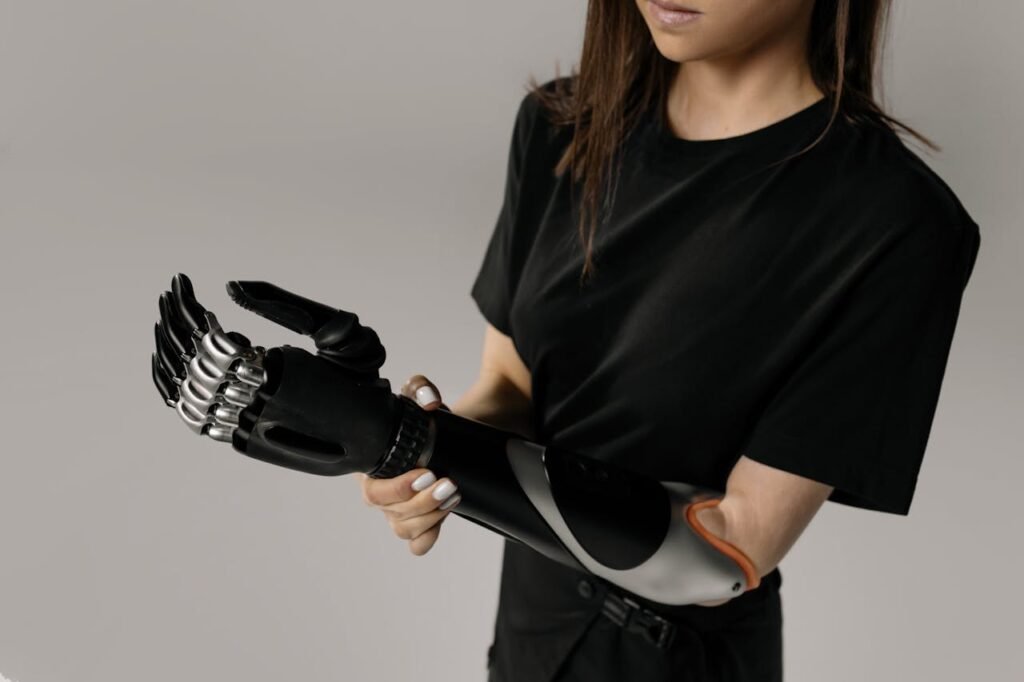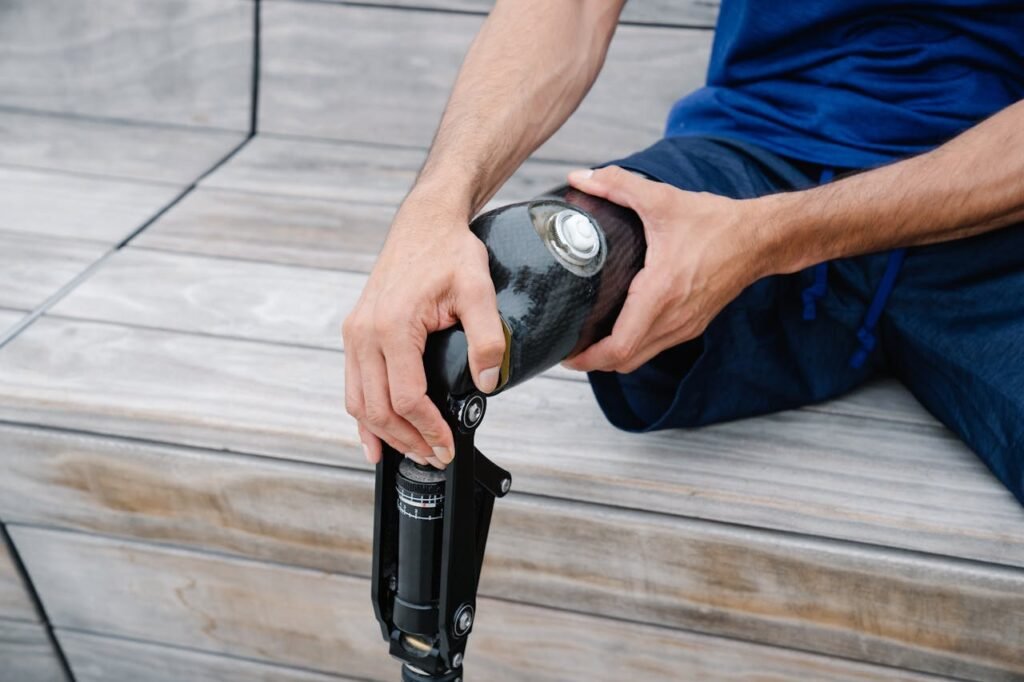Prosthetic devices are life-changing tools that empower individuals to regain independence and mobility. However, like any sophisticated piece of equipment, prosthetics require regular care to ensure they function effectively and remain comfortable for the user. Proper maintenance isn’t just about extending the life of the device—it’s about protecting your health and enhancing your day-to-day experience.
This guide will walk you through practical daily and weekly maintenance routines, offering actionable advice to keep your prosthetic in excellent condition. With a little care and attention, you can maximize its performance and longevity.
The Importance of Routine Prosthetic Maintenance
Maintaining a prosthetic isn’t just about keeping it clean—it’s about ensuring it fits properly, functions efficiently, and doesn’t cause unnecessary discomfort or health issues. Small, consistent efforts in daily and weekly maintenance can prevent larger, costly repairs and help you avoid complications like skin irritation or breakdown.
Safeguarding Your Skin
Your skin is the first point of contact with your prosthetic device, making its care a priority. Poorly maintained prosthetics or liners can lead to issues like rashes, sores, or bacterial infections. Regular cleaning and inspection reduce these risks and ensure you remain comfortable.
Ensuring Optimal Functionality
Prosthetics, especially advanced bionic devices, rely on precise mechanics or electronics to operate smoothly. Dust, dirt, or wear and tear can affect performance over time. Routine maintenance helps catch minor issues early, preventing them from escalating into significant malfunctions.
Extending the Lifespan of Your Prosthetic
Prosthetic devices are an investment in your mobility and independence. Proper care ensures that your device remains functional for as long as possible, saving you time and money in repairs or replacements.
Daily Maintenance Tips
Daily care is about creating habits that keep your prosthetic clean, comfortable, and ready for use. These steps don’t take much time but have a significant impact on your overall experience.
Cleaning and Hygiene
At the end of each day, make it a priority to clean your prosthetic and any liners or socks you wear. Use a mild, non-abrasive soap and lukewarm water to remove sweat, oils, and debris. Avoid harsh chemicals that might damage the materials.
Pay special attention to areas that come into direct contact with your skin, such as the socket or gel liners. After cleaning, dry these components thoroughly, as moisture can promote bacterial growth.
For advanced bionic prosthetics, be cautious when cleaning electronic components. Use a soft, dry cloth to wipe down sensors or joints, and follow the manufacturer’s guidelines for cleaning to avoid damage.
Inspect for Wear and Tear
Daily inspections help you catch small issues before they worsen. Look for signs of wear, such as cracks, loose screws, or unusual noises. If you notice anything unusual, make a note of it and address it promptly.
Also, check the alignment and fit of the prosthetic. Changes in your weight or activity level can affect how it fits, so be vigilant about how it feels throughout the day.

Caring for Your Skin
Your skin’s health directly impacts your comfort and ability to use your prosthetic. After removing your prosthetic device at the end of the day, inspect your skin for redness, irritation, or blisters. These signs may indicate pressure points or poor fit and should not be ignored.
Wash the residual limb with gentle soap and lukewarm water, pat it dry with a soft towel, and apply a skin-friendly moisturizer. Avoid using lotions with strong fragrances or alcohol, as they can dry out the skin or cause irritation.
If you notice persistent issues, consult your prosthetist to adjust the fit or recommend additional skin care solutions.
Proper Storage
When not in use, store your prosthetic in a clean, dry place away from extreme temperatures or direct sunlight. Heat and moisture can degrade certain materials, while excessive cold can stiffen components.
For bionic or electronic prosthetics, keep them in a safe, secure spot to prevent accidental damage or exposure to dust.
Weekly Maintenance Tips
While daily routines focus on cleaning and inspection, weekly maintenance involves a deeper dive into the functionality and long-term health of your prosthetic. Setting aside a dedicated time each week for this ensures your device stays in top condition.
Deep Cleaning
Once a week, perform a more thorough cleaning of all removable components, such as liners, socks, and straps. Hand wash these items with mild soap and allow them to air dry completely before reassembling.
For the prosthetic itself, use a damp cloth to wipe down hard-to-reach areas, such as joints or hinges. If your device has a carbon-fiber or metal frame, check for any residue or grime that might have accumulated over time.
Ensure you also clean any padding or cushioning inside the prosthetic. This prevents the buildup of sweat or bacteria, which can lead to unpleasant odors or skin issues.
Functional Checks
A weekly functional assessment ensures your prosthetic is working as intended. Check the joints, hinges, or electronic components for smooth operation.
Test all movable parts to ensure they are not sticking or grinding. If your device includes myoelectric sensors or motors, confirm that they are responding accurately to your movements.
For devices with rechargeable batteries, inspect the battery compartment for corrosion and ensure the battery is holding a charge effectively. If you notice shorter usage times, it may be time to replace the battery or consult the manufacturer for servicing.
Alignment and Fit Assessment
Prosthetic alignment and fit are critical for comfort and functionality. Over time, even slight misalignments can lead to discomfort, uneven wear, or strain on your residual limb. During your weekly maintenance routine, pay close attention to how your prosthetic feels and performs during use.
If you notice any issues—such as discomfort, difficulty walking, or unusual pressure points—this could indicate a need for professional adjustment.
Subtle changes in your body, such as weight fluctuations or muscle development, can also affect fit. Scheduling regular check-ins with your prosthetist ensures these adjustments are addressed promptly.
Lubrication and Moving Parts
For prosthetics with mechanical joints, lubrication is essential to maintain smooth operation. Check the user manual for recommended lubricants and apply them sparingly to avoid buildup. Over-lubrication can attract dust and grime, potentially causing damage.
Be sure to wipe away any old lubricant and inspect the joints for debris before reapplying. This step prevents wear and tear on moving parts, ensuring they remain efficient and reliable over time.
Addressing Minor Repairs
While many issues with a prosthetic require professional attention, minor repairs can often be handled at home with the right tools. For example, tightening a loose screw or securing a strap can be done quickly and prevent more significant problems from developing.
Keep a small toolkit designed for prosthetic maintenance, including items such as an Allen wrench, screwdriver, and spare screws. Always follow manufacturer guidelines when performing repairs to avoid voiding warranties or causing unintended damage.
When to Seek Professional Maintenance
Even with diligent daily and weekly care, there are times when professional servicing is necessary. Prosthetists are trained to address complex issues, perform precise adjustments, and conduct thorough inspections that go beyond routine maintenance.
Recognizing the Signs
You should schedule a visit with your prosthetist if you experience recurring discomfort, noticeable misalignment, or reduced functionality. Unusual noises, such as clicking or grinding, may indicate internal wear that needs attention.
Additionally, any visible cracks, tears, or damage to electronic components warrant immediate professional care.
For bionic prosthetics, regular software updates may be required to ensure optimal performance. Your prosthetist or manufacturer can guide you through these updates and address any compatibility concerns.
Understanding the Warning Signs
Prosthetics are complex devices, and even with the best care, wear and tear are inevitable. Users must be vigilant in identifying warning signs that indicate professional attention is needed.
If a prosthetic begins to cause persistent discomfort, such as chafing, pinching, or unusual pressure points, this could signal that the fit is no longer optimal.
Misalignment, caused by factors like weight changes or component wear, can lead to inefficient movement or pain over time. Addressing these issues early through professional maintenance prevents further complications, including damage to the residual limb.

Users may also notice functional problems, such as reduced range of motion, irregular noises like clicking or grinding, or difficulty in executing tasks that were previously effortless.
These signs often point to mechanical issues that require expert diagnosis. Businesses can help users by providing clear guidelines on what to look for and encouraging regular check-ups.
The Role of Regular Check-Ups
Professional maintenance isn’t just reactive—it should be proactive. Businesses can educate users on the importance of scheduling periodic check-ups, even if there are no obvious problems.
These appointments allow prosthetists to inspect the device for hidden wear, recalibrate components, and address minor adjustments before they become major issues.
For instance, users with bionic prosthetics may benefit from software updates or recalibration of sensors to maintain peak performance. A check-up can also reveal areas where wear and tear are developing, such as joints or suspension systems, enabling preventative repairs.
By emphasizing the value of routine check-ups, businesses create a culture of care that enhances user satisfaction and extends the life of their devices.
Ensuring Accessibility to Professional Services
Accessibility to professional maintenance is a critical consideration for businesses. Users need to feel confident that they can quickly and conveniently access repair and adjustment services when required.
Businesses can achieve this by establishing a robust network of service providers, offering remote consultations, or integrating maintenance plans into their offerings.
For example, a company could partner with local prosthetists or clinics to ensure that users have access to in-person services. Alternatively, virtual consultations can be an effective way to diagnose minor issues or guide users through basic troubleshooting.
Providing these options not only enhances customer experience but also strengthens trust in the brand.

Supporting Users with Emergency Needs
Emergencies, such as a broken component or sudden loss of functionality, require immediate attention. Businesses can support users by offering rapid-response repair services or replacement parts to minimize downtime.
Providing a clear process for handling urgent maintenance requests, including dedicated hotlines or priority service, ensures that users feel supported during critical moments.
For instance, a prosthetic manufacturer could offer an emergency repair program that includes expedited shipping for replacement components or on-site servicing in certain regions.
Communicating these options clearly to users reinforces the company’s commitment to their well-being.
Empowering Users Through Education
Businesses can play an active role in educating users about the importance of professional maintenance and how to recognize when it’s needed.
This might include distributing maintenance guides, offering workshops, or creating video tutorials that explain common issues and when to seek help.
A well-informed user is more likely to take proactive steps to maintain their prosthetic, reducing the risk of significant damage and ensuring a positive experience with the device.
By positioning themselves as a reliable source of knowledge, businesses build stronger relationships with their customers and encourage long-term loyalty.
Strengthening Business Impact Through Service Excellence
By prioritizing professional maintenance as part of their service strategy, businesses can differentiate themselves in a competitive market. Offering tailored maintenance packages, flexible service options, and accessible support channels ensures that users feel valued and cared for.
These initiatives not only enhance customer satisfaction but also contribute to the longevity and success of the product.
Incorporating innovative approaches, such as predictive maintenance powered by smart sensors or subscription-based servicing plans, demonstrates a commitment to advancing user care.
When businesses invest in making professional maintenance seamless and accessible, they empower users to enjoy the full benefits of their prosthetic while strengthening their own reputation for excellence.

Tips for Long-Term Prosthetic Care
Beyond daily and weekly maintenance, there are steps you can take to ensure your prosthetic remains effective over the long term. These strategies focus on building habits and planning for sustained performance.
Adopting a Preventative Approach
Preventative care is key to avoiding costly repairs or replacements. Handle your prosthetic gently, especially when removing or cleaning it, and avoid exposing it to harsh environments.
For example, if you plan to engage in activities such as swimming or hiking, ensure your prosthetic is designed for those conditions or has protective features like water-resistant seals.
Keeping Spare Components
Over time, wearable components such as liners, straps, or socks may wear out and need replacement.
Keeping a supply of these items ensures you can address minor issues without interrupting your routine. If your prosthetic includes removable covers or parts, consider rotating them regularly to extend their lifespan.
Staying Informed
Prosthetic technology is constantly evolving, with new advancements improving comfort, functionality, and durability. Staying informed about upgrades, accessories, or alternative designs can help you make the most of your device.
Regular communication with your prosthetist and following updates from the manufacturer will keep you aware of any new developments relevant to your needs.
Building a Relationship with Your Prosthetist
Your prosthetist is a key partner in maintaining and optimizing your prosthetic device. Regular appointments ensure that any adjustments, repairs, or upgrades are done professionally and tailored to your needs. Developing a strong relationship with your prosthetist makes it easier to discuss concerns and receive personalized advice.
Keep a record of any issues or changes in your experience with the prosthetic. For example, note instances of discomfort, unusual sounds, or decreased performance. Sharing these observations during check-ups allows your prosthetist to address problems proactively.
For individuals using advanced bionic prosthetics, your prosthetist can also provide guidance on software updates, component replacements, and emerging technologies that might enhance your experience.

The Role of Businesses in Supporting Prosthetic Maintenance
While individuals play a crucial role in daily and weekly care, businesses—especially manufacturers and service providers—have a significant responsibility in making prosthetic maintenance accessible and manageable.
Offering Clear Maintenance Guidelines
Manufacturers can empower users by providing detailed yet easy-to-understand maintenance instructions. This includes step-by-step cleaning guides, troubleshooting tips, and visual aids to help users care for their devices effectively.
Clear guidelines reduce the risk of accidental damage and ensure users feel confident in managing their prosthetics.
For example, businesses could offer video tutorials or interactive apps that walk users through daily and weekly maintenance routines. These resources not only improve user satisfaction but also reinforce trust in the brand.
Providing Accessible Support
Timely and accessible customer support is essential for addressing maintenance concerns. Businesses should invest in responsive service channels, such as dedicated helplines, email support, or live chat options, to assist users with troubleshooting or repair needs.
Some companies also offer remote consultations with prosthetists or technicians, allowing users to discuss issues without needing to visit a clinic.
This is particularly valuable for individuals in remote or underserved areas, ensuring they receive expert guidance regardless of their location.
Encouraging Community Engagement
Prosthetic manufacturers can foster a sense of community among users by organizing workshops, webinars, or support groups focused on maintenance and care.
These events provide opportunities for users to share experiences, ask questions, and learn from experts in an interactive setting.
For instance, a monthly online workshop on “Prosthetic Maintenance Best Practices” could address common concerns, introduce new products or techniques, and build a loyal customer base. These initiatives demonstrate a company’s commitment to user well-being beyond the point of sale.
Future Trends in Prosthetic Maintenance
The field of prosthetics is rapidly advancing, and these developments are reshaping how devices are maintained. Businesses and users alike can look forward to technologies that simplify care and improve long-term performance.
Smart Prosthetics with Self-Diagnostic Tools
Emerging bionic prosthetics are equipped with self-diagnostic systems that monitor functionality and alert users to potential issues. These devices can detect wear and tear, track usage patterns, and recommend maintenance actions through a connected app.
For users, this means greater peace of mind and fewer unexpected malfunctions. For businesses, offering smart prosthetics represents an opportunity to lead in innovation and enhance customer satisfaction.

Sustainable Materials and Designs
Sustainability is becoming a priority in prosthetic manufacturing. Materials that are durable, eco-friendly, and easy to maintain reduce the overall cost of ownership and environmental impact. Designs that allow for quick and straightforward repairs further improve accessibility for users.
Manufacturers investing in sustainable solutions can appeal to environmentally conscious consumers while promoting devices that are both practical and long-lasting.
Conclusion
Maintaining a prosthetic device may seem daunting at first, but with consistent daily and weekly care, it becomes a manageable and rewarding routine.
From cleaning and inspecting your prosthetic to seeking professional guidance when needed, these practices ensure your device remains comfortable, functional, and durable.
Businesses, too, have a vital role in empowering users through clear instructions, accessible support, and innovative technologies. Together, individuals and manufacturers can ensure that prosthetics not only restore mobility but also enhance quality of life.
At Robobionics, we’re committed to providing tools and resources that make prosthetic care seamless and effective. Our flagship product, Grippy™, is designed for durability and ease of maintenance, ensuring that users can focus on living life to the fullest.



